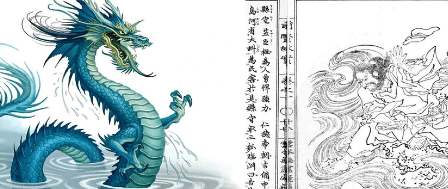Japanese Dragon Names

The exploration of Japanese dragon names reveals a profound cultural narrative intertwined with mythology and symbolism. Renowned figures such as Ryujin, the oceanic deity, and Yamata no Orochi, the eight-headed serpent, exemplify the duality of strength and chaos inherent in these creatures. Furthermore, lesser-known entities like Watatsumi highlight the intricate relationships between dragons and natural elements. As we examine these names and their implications, one may wonder how these mythical beings influence contemporary perceptions of nature and power within Japanese culture.
Famous Japanese Dragon Gods
Japanese mythology is rich with dragon deities, each embodying unique traits and serving distinct roles within the cultural and religious landscape of Japan.
Central to Ryujin mythology is the sea god Ryujin, symbolizing power and fertility.
In contrast, Yamata no Orochi represents chaos and destruction, illustrating the duality of dragon symbolism.
Together, they highlight the complex relationship between nature and humanity in Japanese belief systems.
Lesser-Known Dragon Names
Exploring the lesser-known dragon names in Japanese folklore reveals a tapestry of cultural significance and regional variations that enrich the understanding of these mythical creatures.
Names like Watatsumi, associated with water deities, illustrate the connection between dragons and natural elements.
Additionally, Kirin legends reflect the blending of dragon-like qualities with other mythical beings, showcasing the diversity inherent in Japan’s rich mythological landscape.
See also: Japanese Name for Dragon
Cultural Significance and Symbolism
The intricate tapestry of Japanese dragon names is not only a reflection of regional folklore but also embodies profound cultural significance and symbolism that resonate throughout various aspects of society.
Rooted in mythical origins, these names encapsulate values such as strength, wisdom, and protection.
Dragon symbolism serves as a reminder of harmony between humanity and nature, highlighting the enduring influence of these majestic beings.
Conclusion
In summary, Japanese dragon names encapsulate a profound interplay between cultural reverence and natural phenomena.
These mythical beings, ranging from renowned figures like Ryujin to the lesser-known Watatsumi, serve as embodiments of the duality inherent in nature—both protector and destroyer.
The symbolism woven into these names underscores a nuanced understanding of existence, inviting contemplation on humanity’s interconnectedness with the cosmos.
Thus, within the lore of Japanese dragons lies a mirror reflecting the complexities of life itself.
See also: Japanese Name for Snow





